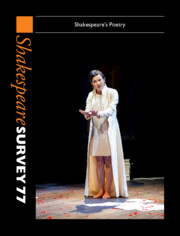Book contents
- Shakespeare Survey
- Shakespeare Survey
- Shakespeare Survey
- Copyright page
- Editor’s Note
- Contributors
- Contents
- Illustrations
- Remembering shakespeare’s Sonnets in Lucy Negro, Redux
- The Poetics of Antiquarian Accumulation in a Lover’s Complaint
- Different Samenesses
- Shakespeare’s Canvas
- ‘Persuasion by Similitude’: Finding Likeness in Shakespeare’s a Lover’s Complaint
- ‘Nothing-to-be-glossed-here’: Race in Shakespeare’s Sonnets
- Allegorical Desire, or, the Sufi ‘Phoenix and the Turtle’
- The Poetics of Shakespearian Erasure: Lyric Thinking with Bhanu Kapil and Preti Taneja
- Lucrece, Letters and the Moment of Lipsius
- Shakespeare’s Arabic Sonnets
- How to make a Formal Complaint: Sara Ahmed’s Complaint! and William Shakespeare’s a Lover’s Complaint
- They also Serve who only Stand and Write, or, how Milton Read Shakespeare’s Sonnets
- Writing Delight with Beauty’s Pen: Restoring Richard Barnfield’s Lost Credit
- Ocular Power and Female Fascinum in Shakespeare’s Venus And Adonis
- Pretty Creatures: A Lover’s Complaint, the Rape of Lucrece and Early Modern Women’s Complaint Poetry
- Lyric Voices and Cultural Encounters Across Time and Space: The Poetry of William Shakespeare and Faiz Ahmed Faiz (1911–1984)
- The thing itself or the image of that Horror: Fictions, Fascisms and We that are young
- Shakespeare’s Refugees
- Shakespeare as a Source of Dramaturgical Reconstruction
- Shakespeare, Race, Postcoloniality: The State of the Fields
- Asian Shakespeares online from Singapore
- Strange Shadows: Translating Shakespeare – The State of the Field
- Gender and Sexuality: The State of the Fields
- Shakespeare Performances in England, 2022–2023
- Productions Outside London, 2022–2023
- Professional Shakespeare Productions in the UK, January–December 2022
- The Year’s Contribution to Shakespeare Studies
- Abstracts of Articles in Shakespeare Survey 77
- Index
Shakespeare Performances in England, 2022–2023
Published online by Cambridge University Press: 07 November 2024
- Shakespeare Survey
- Shakespeare Survey
- Shakespeare Survey
- Copyright page
- Editor’s Note
- Contributors
- Contents
- Illustrations
- Remembering shakespeare’s Sonnets in Lucy Negro, Redux
- The Poetics of Antiquarian Accumulation in a Lover’s Complaint
- Different Samenesses
- Shakespeare’s Canvas
- ‘Persuasion by Similitude’: Finding Likeness in Shakespeare’s a Lover’s Complaint
- ‘Nothing-to-be-glossed-here’: Race in Shakespeare’s Sonnets
- Allegorical Desire, or, the Sufi ‘Phoenix and the Turtle’
- The Poetics of Shakespearian Erasure: Lyric Thinking with Bhanu Kapil and Preti Taneja
- Lucrece, Letters and the Moment of Lipsius
- Shakespeare’s Arabic Sonnets
- How to make a Formal Complaint: Sara Ahmed’s Complaint! and William Shakespeare’s a Lover’s Complaint
- They also Serve who only Stand and Write, or, how Milton Read Shakespeare’s Sonnets
- Writing Delight with Beauty’s Pen: Restoring Richard Barnfield’s Lost Credit
- Ocular Power and Female Fascinum in Shakespeare’s Venus And Adonis
- Pretty Creatures: A Lover’s Complaint, the Rape of Lucrece and Early Modern Women’s Complaint Poetry
- Lyric Voices and Cultural Encounters Across Time and Space: The Poetry of William Shakespeare and Faiz Ahmed Faiz (1911–1984)
- The thing itself or the image of that Horror: Fictions, Fascisms and We that are young
- Shakespeare’s Refugees
- Shakespeare as a Source of Dramaturgical Reconstruction
- Shakespeare, Race, Postcoloniality: The State of the Fields
- Asian Shakespeares online from Singapore
- Strange Shadows: Translating Shakespeare – The State of the Field
- Gender and Sexuality: The State of the Fields
- Shakespeare Performances in England, 2022–2023
- Productions Outside London, 2022–2023
- Professional Shakespeare Productions in the UK, January–December 2022
- The Year’s Contribution to Shakespeare Studies
- Abstracts of Articles in Shakespeare Survey 77
- Index
Summary
This is my last Shakespeare review for this journal, and a good thing too. Most of the Shakespeare productions I saw this year were really adaptations. Almost all were ‘presentist’. This does not mean that I didn’t enjoy many of them, just that my particular kind of expertise was largely useless: their ideal reviewer would be a social historian or an expert on popular culture. Because the collective tendency seemed to me significant, I am covering more productions than usual, and, because they were dominated by a directorial vision, I am naming only directors. This is of course unfair to the actors, but the abundance of online reviews means that anyone can supplement my accounts. Directors often seemed to rely on their audience’s previous experience or expectations of the plays, which is presumably why they mostly confined themselves to the same small group that everyone already knows.
- Type
- Chapter
- Information
- Shakespeare Survey 77Shakespeare's Poetry, pp. 281 - 291Publisher: Cambridge University PressPrint publication year: 2024

